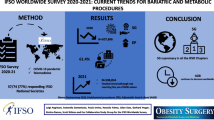Abstract
Purpose
To define the effects of body mass index (BMI) on operative outcomes for both gastroenterological and cardiovascular surgery, using the National Clinical Database (NCD) of the Japanese nationwide web-based database.
Methods
The subjects of this study were 288,418 patients who underwent typical surgical procedures between January 2011 and December 2012. There were eight gastroenterological procedures, including esophagectomy, distal gastrectomy, total gastrectomy, right hemicolectomy, low anterior resection, hepatectomy of >1 segment excluding the lateral segment, pancreaticoduodenectomy, and surgery for acute diffuse peritonitis (n = 232,199); and five cardiovascular procedures, including aortic valve replacement, total arch replacement (TAR), descending thoracic aorta replacement (descending TAR), and on- or off-pump coronary artery bypass grafting (n = 56,219). The relationships of BMI with operation time and operative mortality for each procedure were investigated, using the NCD.
Results
Operation times were longer for patients with a higher BMI. When a BMI cut-off of 30 was used, the operation time for obese patients was significantly longer than that for non-obese patients, for all procedures except esophagectomy (P < 0.01). The mortality rate based on BMI revealed a U-shaped distribution, with both underweight and obese patients having high mortality rates for almost all procedures.
Conclusions
This Japanese nationwide study provides solid evidence to reinforce that both obesity and excessively low weight are factors that impact operative outcomes significantly.



Similar content being viewed by others
References
Krishnamurthi RV, Feigin VL, Forouzanfar MH, Mensah GA, Connor M, Bennett DA, et al. Global and regional burden of first-ever ischaemic and haemorrhagic stroke during 1990–2010: findings from the Global Burden of Disease Study 2010. Lancet Glob Health. 2013. doi:10.1016/S2214-4109X(13)70089-5.
World Health Organization. Global status report on noncommunicable disease 2010. http://www.who.int/nmh/publications/ncd_report_full_en.pdf. Accessed 1 Oct 2014).
Ogden CL, Carroll MD, Kit BK, Flegal KM. Prevalence of childhood and adult obesity in the United States, 2011–2012. JAMA. 2014;311:806–14.
Funatogawa I, Funatogawa T, Nakao M, Karita K, Yano E. Changes in body mass index by birth cohort in Japanese adults: results from the National Nutrition Survey of Japan 1956–2005. Int J Epidemiol. 2009;38:83–92.
Matsushita Y, Takahashi Y, Mizoue T, Inoue M, Noda M, Tsugane S. Overweight and obesity trends among Japanese adults: a 10-year follow-up of the JPHC Study. Int J Obes (Lond). 2008;32:1861–7.
Yoshiike N, Seino F, Tajima S, Arai Y, Kawano M, Furuhata T, et al. Twenty-year changes in the prevalence of overweight in Japanese adults: the National Nutrition Survey 1976–95. Obes Rev. 2002;3:183–90.
Kouda K, Nakamura H, Nishio N, Fujita Y, Takeuchi H, Iki M. Trends in body mass index, blood pressure, and serum lipids in Japanese children: Iwata population-based annual screening (1993–2008). J Epidemiol. 2010;20:212–8.
Bhayani NH, Gupta A, Dunst CM, Kurian AA, Halpin VJ, Swanstrom LL. Does morbid obesity worsen outcomes after esophagectomy? Ann Thorac Surg. 2013;95:1756–61.
Sugimoto M, Kinoshita T, Shibasaki H, Kato Y, Gotohda N, Takahashi S, et al. Short-term outcome of total laparoscopic distal gastrectomy for overweight and obese patients with gastric cancer. Surg Endosc. 2013;27:4291–6.
Makino T, Trencheva K, Shukla PJ, Rubino F, Zhuo C, Pavoor RS, et al. The influence of obesity on short- and long-term outcomes after laparoscopic surgery for colon cancer: a case-matched study of 152 patients. Surgery. 2014;156:661–8.
Saunders JK, Rosman AS, Neihaus D, Gouge TH, Melis M. Safety of hepatic resections in obese veterans. Arch Surg. 2012;147:331–7.
El Nakeeb A, Hamed H, Shehta A, Askr W, El Dosoky M, Said R, et al. Impact of obesity on surgical outcomes post-pancreaticoduodenectomy: a case-control study. Int J Surg. 2014;12:488–93.
Zdichavsky M, Bashin YA, Blumenstock G, Zieker D, Meile T, Konigsrainer A. Impact of risk factors for prolonged operative time in laparoscopic cholecystectomy. Eur J Gastroenterol Hepatol. 2012;24:1033–8.
Alam M, Siddiqui S, Lee VV, Elayda MA, Nambi V, Yang EY, et al. Isolated coronary artery bypass grafting in obese individuals: a propensity matched analysis of outcomes. Circ J. 2011;75:1378–85.
Smith RL 2nd, Herbert MA, Dewey TM, Brinkman WT, Prince SL, Ryan WH, et al. Does body mass index affect outcomes for aortic valve replacement surgery for aortic stenosis? Ann Thorac Surg. 2012;93:742–6.
Watanabe M, Miyata H, Gotoh M, Baba H, Kimura W, Tomita N, et al. Total gastrectomy risk model: data from 20,011 Japanese patients in a Nationwide Internet-Based Database. Ann Surg. 2014;260:1034–9.
Kimura W, Miyata H, Gotoh M, Hirai I, Kenjo A, Kitagawa Y, et al. A pancreaticoduodenectomy risk model derived from 8575 cases from a national single-race population (Japanese) using a web-based data entry system: the 30-day and in-hospital mortality rates for pancreaticoduodenectomy. Ann Surg. 2014;259:773–80.
Dohi M, Miyata H, Doi K, Okawa K, Motomura N, Takamoto S, et al. The off-pump technique in redo coronary artery bypass grafting reduces mortality and major morbidities: propensity score analysis of data from the Japan Cardiovascular Surgery Database. Eur J Cardiothorac Surg. 2015;47:299–308.
Yasunaga H, Horiguchi H, Matsuda S, Fushimi K, Hashimoto H, Ayanian JZ. Body mass index and outcomes following gastrointestinal cancer surgery in Japan. Br J Surg. 2013;100:1335–43.
Valentijn TM, Galal W, Tjeertes EK, Hoeks SE, Verhagen HJ, Stolker RJ. The obesity paradox in the surgical population. Surgeon. 2013;11:169–76.
Mullen JT, Moorman DW, Davenport DL. The obesity paradox: body mass index and outcomes in patients undergoing nonbariatric general surgery. Ann Surg. 2009;250:166–72.
Davenport DL, Xenos ES, Hosokawa P, Radford J, Henderson WG, Endean ED. The influence of body mass index obesity status on vascular surgery 30-day morbidity and mortality. J Vasc Surg. 2009;49:140–7.
WHO Expert Consultation. Appropriate body-mass index for Asian populations and its implications for policy and intervention strategies. Lancet. 2004;363:157–63.
Deurenberg P, Yap M, van Staveren WA. Body mass index and percent body fat: a meta analysis among different ethnic groups. Int J Obes Relat Metab Disord. 1998;22:1164–71.
Seishima R, Okabayashi K, Hasegawa H, Sugiyama D, Ishii Y, Tsuruta M, et al. Obesity was associated with a decreased postoperative recurrence of rectal cancer in a Japanese population. Surg Today. 2014;44:2324–31.
Kim SH, Park HS, Kim KH, Yoo H, Chae BJ, Bae JS, et al. Correlation between obesity and clinicopathological factors in patients with papillary thyroid cancer. Surg Today. 2015;45:723–9.
Mullen JT, Davenport DL, Hutter MM, Hosokawa PW, Henderson WG, Khuri SF, et al. Impact of body mass index on perioperative outcomes in patients undergoing major intra-abdominal cancer surgery. Ann Surg Oncol. 2008;15:2164–72.
Author information
Authors and Affiliations
Corresponding author
Ethics declarations
Conflict of interest
None of the authors has any conflicts of interest to disclose.
Funding/support
This study was funded by the Japan Surgical Society.
Role of the funders/sponsors
The NCD data used in this study were collected by the Japan Surgical Society. The Japan Surgical Society reviewed and approved this article before its submission.
Additional information
On behalf of the Japan Surgical Society.
Rights and permissions
About this article
Cite this article
Ri, M., Miyata, H., Aikou, S. et al. Effects of body mass index (BMI) on surgical outcomes: a nationwide survey using a Japanese web-based database. Surg Today 45, 1271–1279 (2015). https://doi.org/10.1007/s00595-015-1231-2
Received:
Accepted:
Published:
Issue Date:
DOI: https://doi.org/10.1007/s00595-015-1231-2




